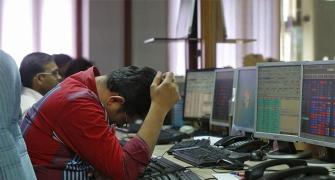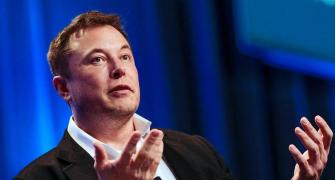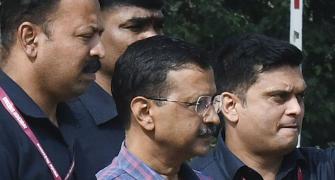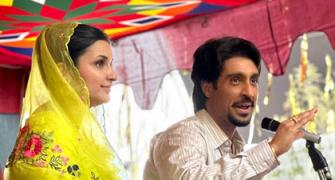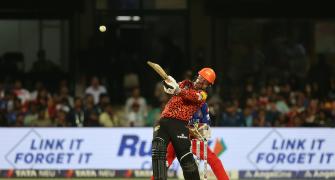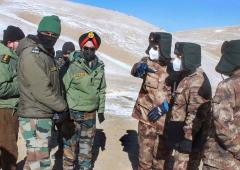The United States Senators and Congressmen, Saran interacted with, assured him that the US Congress is committed to the India-US civilian nuclear agreement and the enabling legislation to facilitate the deal would be taken up by the Senate early next week.
Saran met up on Capitol Hill with Senate Majority Leader Bill Frist, Senate Minority Leader Harry Reid and US Representatives Henry Hyde, chairman of the House International Relations Committee, and Tom Lantos, who along with Hyde co-authored the enabling legislation in the House of Representatives -- the Lower House of the US Congress -- that was approved overwhelmingly on June 26 by a thumping 359 to 68 margin.
The foreign secretary's hectic schedule before he returned to New York late Thursday afternoon to be at Mukherjee's side when the Indian minister met with US Secretary of State Condoleezza Rice, also included meetings with senior Bush administration officials, Under Secretary of State for Arms Control and International Security Robert Joseph, and Under Secretary of Commerce for International Economic Relations David McCormick.
A day earlier, Saran had met in New York with Under Secretary of State for Political Affairs Nicholas Burns, the chief US negotiator of the nuclear agreement, and Philip Zelikow, senior counselor to Rice.
The meeting with Burns was to discuss progress on the bilateral civilian nuclear cooperation agreement known as the 123 Agreement, which is required to be completed before the US can finalise a comprehensive nuclear agreement with India.
Last week Burns told rediff.com that he would meet with Saran to continue negotiations on the 123 Agreement and expressed the hope that "we can get our negotiating teams together also very soon back in Delhi to make progress."
Burns acknowledged that "there are a lot of different issues that remain outstanding but I am confident we can bring them all to a close."
"We resolved the major issues in the negotiations leading up to the President's visit to Delhi. So I have always looked at the bilateral agreement as a difficult agreement, especially the codification of what we've already agreed," he said.
Burns said both countries were "past the most difficult phase of the negotiations," and declared, "I believe we can be successful in the bilateral talks."
Congressional sources told rediff.com that both Frist and Reid had assured Saran that they strongly support the India-US strategic partnership and endorse the nuclear deal, which is an integral part of this relationship, and are hopeful that the enabling legislation could be brought to the Senate floor for debate and a vote early next week.
Their optimism has been buoyed by the decision of some conservative Republican Senators led by Senator John Eric Ensign of Nevada to remove the hold on the bill, following changes made to the Title II provision, also known as the International Atomic Energy Agency Additional Protocol.
Ensign's decision to remove the hold on the bill -- authored by Senators Richard Lugar and Joe Biden, chair and ranking member of the Senate Foreign Relations Committee, which approved the legislation by an overwhelming 16-2 margin on June 29 -- sources said, had enhanced the chances of the Senate taking up the legislation for a vote before it adjourned late next week before the November Congressional elections.
Earlier this month, Frist had told rediff.com that no date had been fixed for a full Senate vote and had even predicted that such action may be postponed to the lame-duck session after the November elections.
But in the wake of Ensign and the other Senators removing the hold, the sources said, Frist was negotiating furiously with the Democrats to agree to a two-hour debate sometime early next week, "possibly on September 26."
The Democrats, the sources said, were holding out for at least a four to five hour debate, saying they were likely to have some amendments that would have to be introduced and discussed.
Frist's argument was that the Senate had several other pressing domestic issues to debate and vote on and that it was unlikely that more than a few hours could be set aside for the debate, and that hammering out an agreement on this score was what was now holding up a date and time to be fixed next week.
Meanwhile, according to the sources, both Frist and Reid had sent out memos to their Republican and Democratic colleagues asking for their unanimous consent that there would not be any surprising amendments introduced and that besides the amendments agreed to by the respective sides, the legislation would remain as is and there would be no attempt to tamper with this original bill.
Meanwhile, the sources said both Hyde and Lantos had assured Saran that once the Senate completes its work, they would work expeditiously in conference to iron out any differences between the Senate and House versions of the legislation and agree on a final joint legislation, which could be sent to President George W Bush for his signature.
Last week Lantos told rediff.com that he hoped the Senate would take "similar action in the next few days," as the House had done earlier when he voted overwhelmingly to approve its enabling legislation.
He called on the Bush administration and India to complete its negotiations on the 123 Agreement and other requirements, such as India's agreement with the IAEA and endorsement from the Nuclear Suppliers Group, so that "when the negotiations are fully completed, we can have two more affirmative votes and the ushering in of a new era of geo-strategic cooperation between the world's oldest and largest democracies."



